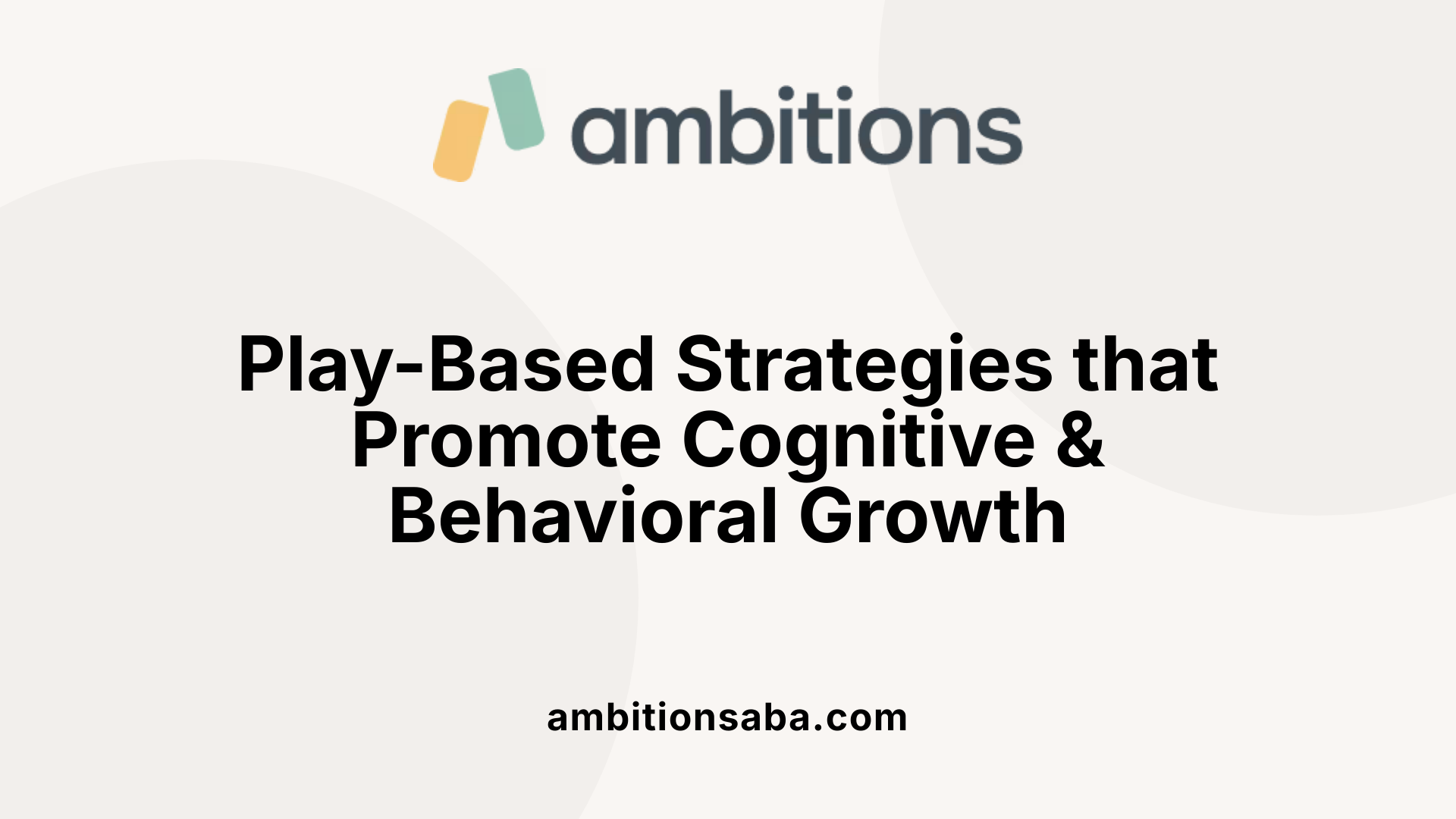The Power of Play in Supporting Children with Autism
Play is a fundamental activity that greatly influences brain development and skill acquisition in children with autism. When integrated into early intervention ABA programs, play becomes a natural, engaging method for teaching a broad array of skills that are crucial for children's growth, communication, and socialization. This article explores the vital role of play in early intervention, highlighting how it contributes to developmental progress, informs treatment strategies, and enhances the overall effectiveness of ABA therapy.
The Diverse Role of Play in Early Intervention for Autism

How does play benefit children with autism in early intervention settings?
Play is a fundamental component of early intervention for children with autism, particularly within Applied Behavior Analysis (ABA) therapy. It offers engaging and meaningful ways for children to develop essential social, communication, and emotional skills.
Play-based ABA therapy creates a positive environment where children practice behaviors such as sharing, turn-taking, and expressing themselves. These activities can reduce anxiety and promote emotional regulation. Play also supports cognitive growth by encouraging problem-solving, motor coordination, and sensory integration.
Different types of play are incorporated to meet each child's unique needs. Structured play provides specific activities targeting particular skills. Free play encourages spontaneous interaction and creativity. Sensory play helps children process sensory information and manage sensitivities. Functional play involves using objects as intended, which fosters understanding of routines and cause-effect relationships. Pretend or symbolic play allows children to explore imagination and social roles.
Assessment of a child's skills often begins with observation during play. Therapists analyze how children interact with toys and activities to determine current abilities. This evaluation guides tailored intervention strategies.
Play activities are designed not only for skill development but also to reinforce positive behaviors through rewards such as praise or access to preferred toys. This positive reinforcement encourages children to repeat desirable behaviors.
Furthermore, these play activities help with generalization, allowing children to transfer learned skills across different settings and routines. This holistic approach boosts the child's confidence and promotes independence.
In conclusion, play plays a vital role in early intervention for autism by making therapy engaging and effective. It enhances social, communication, and emotional skills, laying a strong foundation for future development and daily functioning.
Enhancing Development Through Play: A Multi-Disciplinary Approach

What is the significance of functional play in early intervention programs involving ABA, speech, and occupational therapy?
Functional play holds a crucial role in early intervention strategies for children with developmental challenges, such as autism spectrum disorder (ASD). It involves using toys and objects in their natural way, like rolling a toy car or stirring with a spoon, to foster essential skills.
By engaging in functional play, children learn cause-and-effect relationships, improve problem-solving abilities, and become familiar with daily routines. This type of play directly supports the development of language skills by helping children label objects and understand spatial prepositions.
In multidisciplinary settings, functional play acts as a bridge connecting therapy approaches across ABA, speech, and occupational therapy. It provides a common, natural activity that teaches communication, motor coordination, and social interaction.
For children with ASD, who often have limited adaptive behaviors and social skills, emphasizing functional play helps promote independence. It improves their ability to perform everyday tasks, boosting confidence and self-help skills.
Within ABA therapy, functional play is used to teach social skills, such as turn-taking and interpreting cues. In occupational therapy, it enhances fine motor skills and coordination. Speech therapy benefits from functional activities that support language development and understanding.
Overall, incorporating functional play into early intervention programs creates a comprehensive, engaging environment where children can learn practical skills aligned with their developmental stage. This integrated approach maximizes growth in cognitive, motor, and social domains, setting a strong foundation for future learning and independence.
The Impact of Play on Treatment Effectiveness and Outcomes
How does play contribute to treatment strategies and developmental outcomes for children receiving early intervention ABA?
Play is a core element in early intervention ABA, significantly enhancing the effectiveness of therapy. It makes learning sessions engaging and enjoyable, which encourages children to stay motivated and participate actively. Through play, therapists can introduce a variety of skills—social, communication, and self-help—by using different types such as structured, free, and sensory play.
In ABA therapy, play serves multiple functions. It helps assess a child's current developmental stage, allowing therapists to tailor interventions more effectively. Play activities are carefully chosen to reinforce positive behaviors, ensuring that desired skills are strengthened through consistent, enjoyable routines. Moreover, play facilitates the generalization of skills across different settings, encouraging children to apply what they've learned both at home and in school.
Play also plays a vital role in emotional regulation. Engaging in playful activities helps children reduce anxiety and stress, creating a more receptive environment for learning. It promotes social interactions, encouraging children to cooperate, share, and build relationships, which are fundamental to social development.
Overall, integrating play into ABA therapy not only makes the process more appealing to children but also improves outcomes. It helps children develop a broader range of skills in a naturalistic setting, leading to meaningful progress in their developmental journey.
Facilitating Family Involvement and Generalization Through Play

How can play be integrated into therapy methods to support children with autism during early intervention?
Play serves as a vital element in early intervention programs, especially for children with autism. Therapists incorporate various play-based techniques into their methods to directly support developmental goals. For example, in Applied Behavior Analysis (ABA), structured and natural environment play helps motivate children, teach new skills, and promote consistency across settings. Speech therapists use interactive role-play and communication games to enhance language skills, while occupational therapists focus on sensory and motor play activities that improve coordination and help with sensory processing difficulties.
Child-centered play therapy also plays a crucial role in fostering emotional expression and building positive relationships. These activities are often tailored to the child's interests, making learning enjoyable and engaging. Parents are encouraged to participate in these play sessions and extend them at home, creating a seamless connection between therapy and daily life.
Integrating play into early intervention ensures activities are fun, interactive, and goal-oriented. It makes the learning process natural and motivates children to practice and generalize skills across different environments, ultimately supporting their holistic growth.
Harnessing the Power of Play for lastInG Developmental Gains
Incorporating play into early intervention ABA programs is not merely an enjoyable aspect of therapy—it is a strategic, evidence-based approach that significantly enhances developmental outcomes. Play facilitates motivation, skill generalization, emotional regulation, and social engagement, making it an indispensable tool for therapists and families alike. By tailoring play activities to individual needs and integrating them seamlessly across therapeutic disciplines, caregivers and professionals can foster meaningful progress in children with autism, ultimately supporting their journey towards greater independence, confidence, and quality of life.
References
- How Early Intervention ABA Therapy Uses Play To Teach
- The Role of Play-Based Early Intervention for ASD - AutismCOE
- Play therapy in children with autism: Its role, implications, and ...
- Functional Play in Early Intervention: A Pillar of ABA, Speech, and ...
- Early intervention Autism program - On Target ABA
- How Early Intervention ABA Therapy Uses Play To Teach
- An Examination Of Play Intervention Strategies for Children with ...
- The Role of Play in Interdisciplinary Therapy for Children
- Ayres Sensory Integration® for Addressing Play in Autistic Children
- Play Therapy for Autism: Benefits, Techniques & Tips - Forbrain



